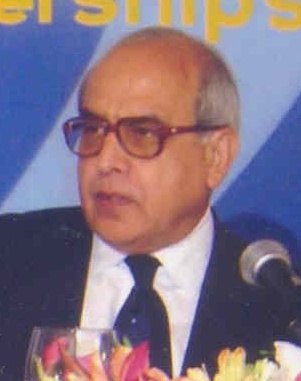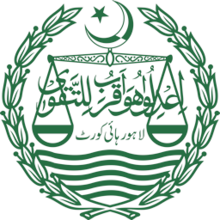
The Pakistan Muslim League (Nawaz) (Urdu: پاکستان مسلم لیگ (ن), abbr.PML(N) or PML-N) is a centre-right, conservative liberal political party in Pakistan. It is currently the third-largest party in the Senate. The party was founded in 1993, when a number of prominent conservative politicians in the country joined hands after the dissolution of Islamic Democratic Alliance, under the leadership of former Prime Minister Nawaz Sharif. The party's platform is generally conservative, which involves supporting free markets, deregulation, lower taxes and private ownership. Although the party historically supported social conservatism, in recent years, the party's political ideology and platform has become more liberal on social and cultural issues; however, members have been accused of using Islamist populist rhetoric. Alongside the Pakistan Tehreek-e-Insaf (PTI) and Pakistan People's Party (PPP), it is one of the three major political parties of the country.

The Pakistan Muslim League Urdu: پاکستان مسلم لیگ (ق); Pākistān Muslim Līg (Qāf), Acronyms: PML(Q), PML-Q, PMLQ, "Q League" is a political party in Pakistan. As of the 2024 parliamentary election, it has a representation of 5 seats. It previously served as an ally of former Prime Minister Raja Pervez Ashraf's government, and led a joint election campaign in 2013 alongside Pakistan Peoples Party (PPP) in Punjab and Balochistan provinces against its rival Pakistan Muslim League (N), a fiscally conservative and centre-right force.

Farooq Ahmad Khan Leghari, was a Pakistani politician who served as the eighth president of Pakistan from 14 November 1993 until resigning on 2 December 1997. He was the first Baloch to be elected as President.

Chaudhry Shujaat Hussain is a senior Pakistani politician who previously served as 16th prime minister of Pakistan. Hussain is the party president of the Pakistan Muslim League (Q) since 2003 .

The Lahore High Court is a provincial court house based in Lahore, Punjab, Pakistan. It was established as a high court on 21 March 1882. The Lahore High Court has jurisdiction over the province of Punjab. The High Court's principal seat is in Lahore, but there are benches in three other cities of the province: Rawalpindi, Multan and Bahawalpur.

The Peshawar High Court is the provincial and highest judicial institution of Khyber Pakhtunkhwa in Pakistan. It is located in the provincial capital Peshawar. The Parliament passed a bill extending the jurisdiction of the Supreme Court (SC) and the Peshawar High Court to Federally Administered Tribal Areas (FATA), one of a handful of reforms paving the way for a merger of the tribal areas with Khyber Pakhtunkhwa.
The following lists events that happened during 1996 in Pakistan.
The family of head of state and government in Pakistan is an unofficial title for the family of the head of state or head of government of a country. In Pakistan, the term First Family usually refers to the head of state or head of government, and their immediate family which comprises their spouse and their descendants. In the wider context, the First Family may comprise the head of state or head of government's parents, siblings and extended relatives.
The First Shehbaz Sharif provincial cabinet was formed by Shehbaz Sharif in 1997 to begin a new government following the 1997 Pakistani general election.








